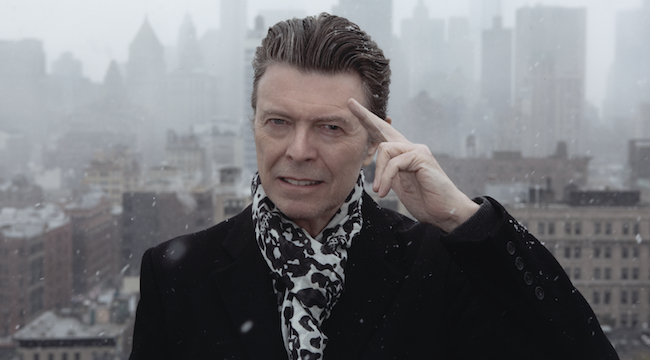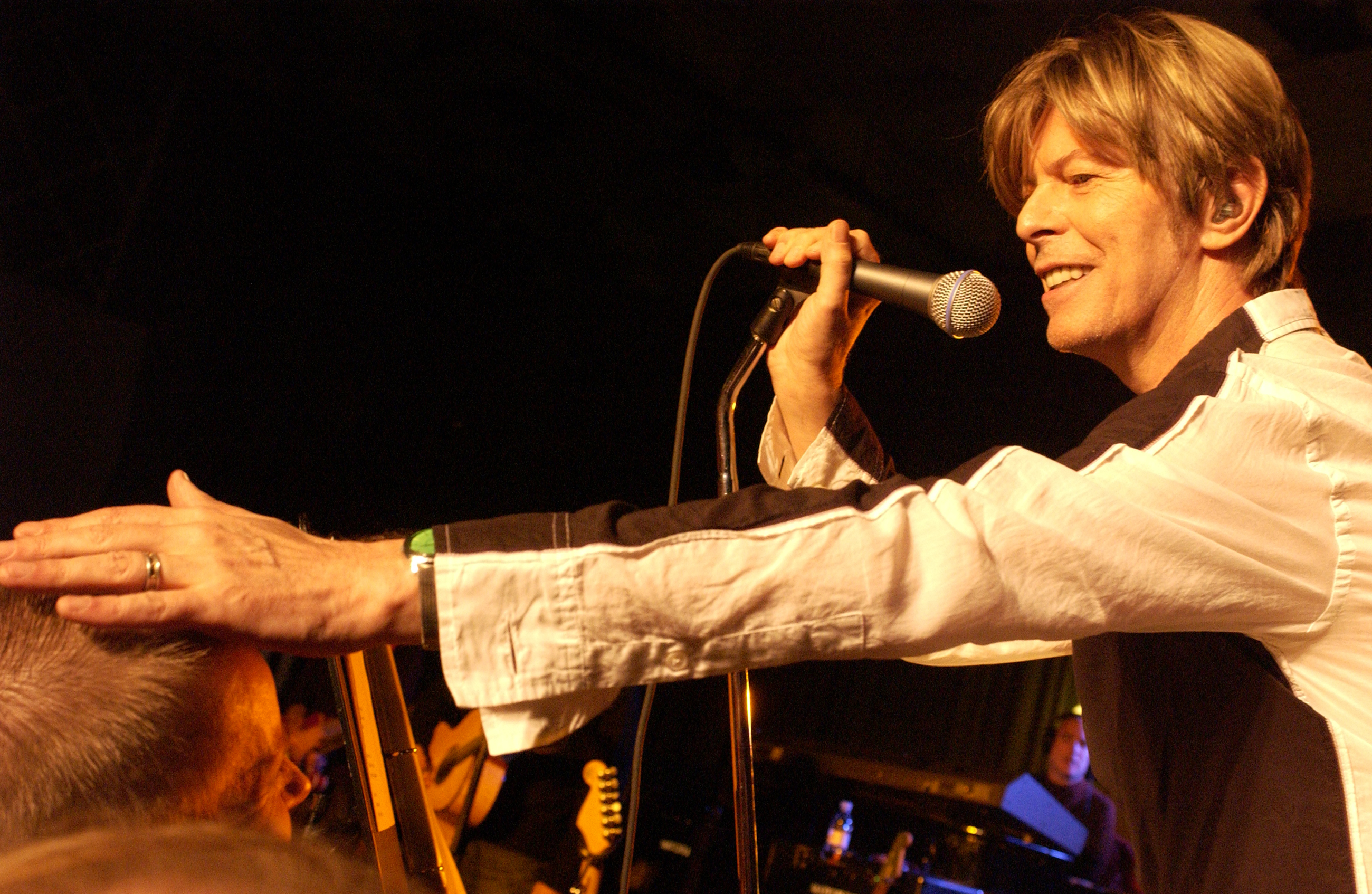
In the early ’90s, Francis Whately met David Bowie after he asked the rock star to participate in a short film he was making for the BBC. For the next 20 years, they remained pen pals.
“He emailed me fairly regularly and told me about books he’d read, and I told him about books I’d read, exhibitions I’d seen, and that sort of thing. But we didn’t hang out or anything like that,” Whately recalled. “I think it may have been quite nice for him to have someone in England, who had English sensibilities, who was talking about books they’ve read and that sort of thing. I think he knew I was a fan, but I didn’t talk to him about his music.”
In 2013, Whately made his first documentary about Bowie, David Bowie: Five Years , about the artist’s pivotal early ’70s period. Now, he’s created a sequel called David Bowie: The Last Five Years, which documents an equally important era that occurred after Bowie’s semi-retirement in the ’00s, when he produced three acclaimed works — 2013’s The Next Day, the musical Lazarus, and 2016’s Blackstar — before his death from liver cancer at age 69.
The Last Five Years, which premieres tonight on HBO, includes never-before-seen footage of Bowie off-stage during his final tour in 2003, including a delightful sequence in which he goofs off with the musicians in his band at a truck stop in the middle of Montana. There are also illuminating clips of his first-ever show in 1970 with Hype, a pre-Spiders From Mars band with long-time producer Tony Visconti, that’s been called the original glitter-rock gig.
What The Last Five Years doesn’t have are interviews with Bowie’s wife, Iman, or his children or close friends who didn’t work with him in a professional capacity. Whately made a conscious choice to focus strictly on Bowie’s creative life, and spoke only with his backing musicians and collaborators like Visconti. What emerges is a film that salutes Bowie’s resolve to keep on creating even as he fell ill, while also respecting the boundaries around his private life that Bowie deliberately set down before he passed.
https://www.youtube.com/watch?v=OwuuDpwPYxo
One of the challenges for making this film, I imagine, is that while Bowie was very active creatively in the last five years of his life, he didn’t give any interviews during that time. How did you work around that?
It was a huge challenge. When I said I would do it, I then had many sleepless nights thinking, how the hell am I gonna do it? Because you’re right, you’ve got five years where there are no interviews. He’s not filmed anywhere other than the videos. And I thought, how am I gonna do this?
So my solution was … [it was] two solutions, really. The first was to look at him in a different way — instead of looking at him as the chameleon of rock, the man who’s constantly changing, look at him in an equally valid way, which is to look at him as the consistent man of rock. The man who thematically remains absolutely the same from the ’60s right up to his passing two years ago. So the themes he’s looking at are those of mortality, spirituality, of alienation, of the effects of fame. These themes remain consistent throughout his career. That was a way that I could look at the last years, through the prism of the past.
You talk with a lot of his collaborators, many of whom were asked by Bowie to keep their work quiet, and even signed non-disclosure agreements. Was it difficult at first to get people to talk about Bowie? Watching the film, there’s a palpable tension between exploring Bowie’s creative process and a desire to respect his privacy even in death.
It was tricky, but I suppose in some ways I’m lucky, in that I wasn’t interested in his private life. I’m not that kind of guy. I’m not that kind of filmmaker. I’m far more interested in the artistic process. And I think I had a fair wind behind me with the people who knew him, especially The Next Day band. I had interviewed them for Five Years, and then we hadn’t been able to include it in that film for many reasons. And so the biggest challenge was you know, I dropped you from that film, but will you talk to me again now? You already went through a lot of work, will you talk to me now? And I was very lucky that they were incredibly gracious, and they were willing to set their time aside again, to talk to me. I think they knew the angle I was coming from. And they knew that I wasn’t gonna ask intrusive questions about David’s private life. I didn’t even attempt to ask his wife, or his daughter, or his son, or friends of his. I just wanted the artistic collaborators.
Bowie’s aversion to fame is a common thread in the film, which of course played out in his final years, when he was extremely press averse. But still, it’s somewhat surprising given that he seemed to court celebrity for so long.
Fame was something that he was fascinated by and craved and desired for so long, in the ’60s and early ’70s, and he changed with the wind, so that he would become famous. So he was a mod for a bit of time, he was vaudeville, he was a mime artist, he was this and that, searching and searching for a vehicle that would make him famous. But then I think once he achieved the fame, and done the rock star thing, and, you know, snorted the cocaine and had girls and all that, I think he, like many people in his position, found it empty and wanted to strive for other things. I think he then thought that he was trapped in some way, that he had become very famous and by the ’80s, very rich as well. But it is a double-edged sword, what you do with that. Where do you go with that? You’ve lost your privacy, you’ve lost a lot of the things that kept you sane.
I think what David Bowie did very effectively, is that he moved to New York, where he was left alone in a way that he would have never been left alone in London. And he sort of closed down. And although he was, in the ’90s particularly, giving lots of interviews, what’s so remarkable is how little he gives away in those interviews. He appears to be very normal and friendly and articulate, and he is all of those things, and he is very jovial, and he appears to be giving you insights into himself, but really I don’t think he is. I really think he’s remaining a very private individual.
So fame is something that I think he dealt with all his life. I think he really was a shy man, and it’s very hard to believe a man who could wear some of the clothes he wore in Ziggy Stardust, or all the other things he did, was a shy man. But I think, from the little I knew him, he was a shy man. He was a private man and a shy man who was happiest when reading a book.

It really does seem remarkable that he was able to keep his life so private for more than a decade, even though he was still one of the most famous rock stars in the world. Have you thought at all about how he was able to pull that off?
I think he hid in plain sight. I met someone in Spain this year, who had been to a gym in Soho [with Bowie], I think. He went to the gym every day, and every day this guy came in and they talked as people at the gym do when they’re getting changed. “How are you? What are you doing today?” Blah, blah, blah. After about two months, someone said to him, “You do know who that guy is, don’t you?
That’s David Bowie.” And it was a regular gym. It wasn’t a fancy gym. I think people didn’t really recognize him, because he had this power of appearing very normal.
The first time I met him, the very first time, he walked past me in the studio. And I knew I was meeting him, but he walked straight past me. And then his assistant came in and said, “Has David arrived?” I went, “No, I don’t think so.” But he had, I just didn’t know, because he dressed very normally.
As a filmmaker, what attracts you to Bowie? What has made you want to dig in so deep into this man’s career, now over the course of two films?
I’ve asked myself that many times. I think his relentless curiosity attracts me to him, more than anything. The fact that he was a Renaissance figure who was interested in absolutely everything around him. The whole world was a fascination to him. Nothing was boring to him. And I think the fact that he tried so many things. That he tried acting, he was a painter, he dabbled in this, he dabbled in that, he read voraciously. He wrote to me about American female soccer, he wrote to me about SpongeBob. This is a man where there’s nothing that doesn’t interest him.
And I suppose his relentless risk-taking as well. Although I’m not really a risk-taker myself, I respect it in other people. And I also respect his integrity. This was a man that, at the end, refused to play the social media game. Guarded his privacy, not ferociously, but very strongly. He wanted his own private life. And he saw the two things were separated. And that I suppose is why, for me to have intruded, in the film, on his private life, would have been an enormous betrayal of everything he stood for.
He’s a remarkable character, and I think he’s a one-off. And I think he will be sorely missed, because I don’t think anyone in future generations will appear quite as mysterious, as exciting, as adventurous, as David Bowie did to us in the 1970s.






